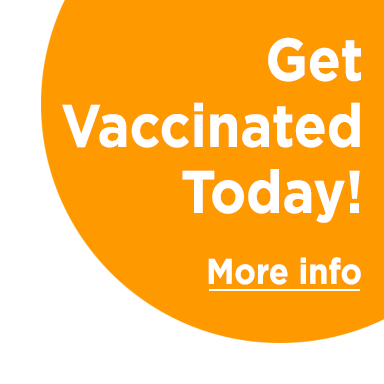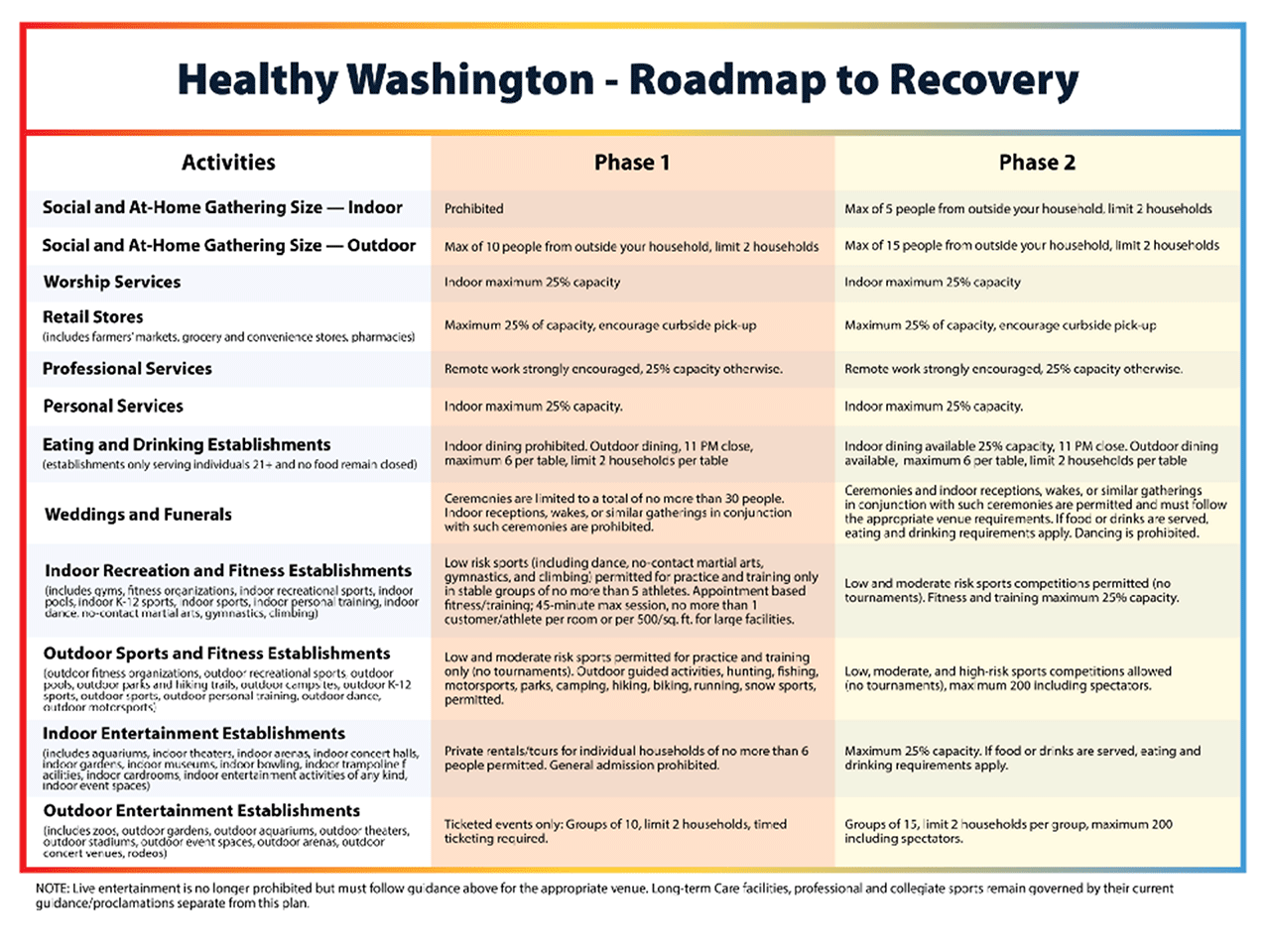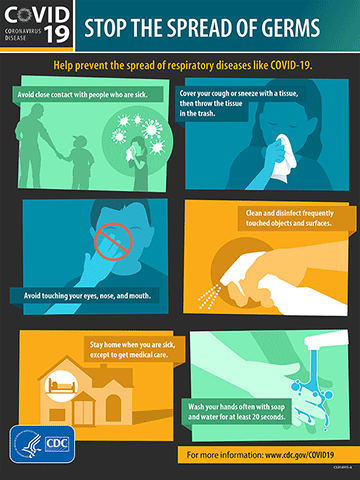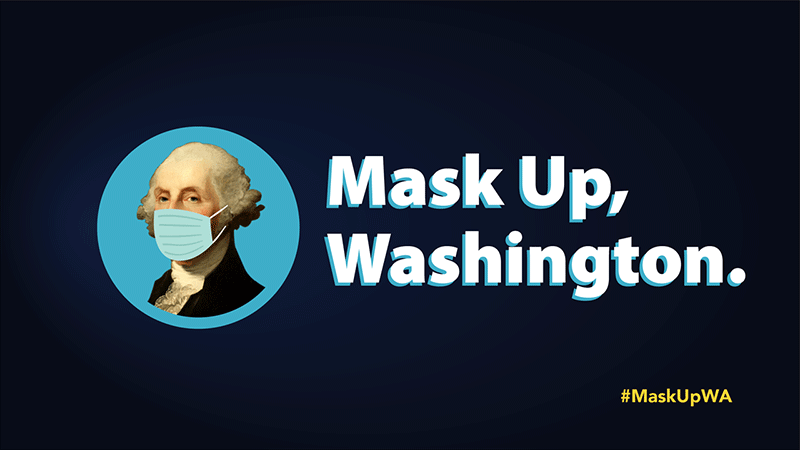Staying Healthy
Our community—and our entire state—is working together to slow the spread of COVID-19. We all have a role to play as we work to reopen our businesses and facilities.
The governor's office has translated information on COVID-19 into a variety of languages.
Vaccine Distribution Continues
Three COVID-19 vaccines have been approved for use, and vaccine is being distributed within the state. Information on the vaccine and its distribution in Washington is found on the DOH web site. In Spokane, the Spokane Regional Health District has convened a vaccine task force to help roll out vaccines in our community, following guidelines provided by the state Department of Health and the CDC. More people will become eligible for vaccines over time.
In Spokane, vaccines are available for eligible individuals at a mass vaccination site at the Spokane Arena and at other sites throughout the Spokane area.
- Check the current vaccination eligibility information (PDF 151 KB)
- Find out if you are eligible for the vaccine now
- Learn about Transportation Options to get to the Spokane Arena
"Smart" Contact Tracing
The state has launched a new smartphone app—Washington Exposure Notifications or "WA Notify"—to alert users who may have been exposed to COVID-19. The app is completely private, and it doesn't know or track who you are or where you go. More information on the app, including instructions on how to add it to your phone is found on the Washington State Department of Health web page.
Reopening & Staying Safe
On Jan. 5, Washington Gov. Jay Inslee announced a new “Healthy Washington” reopening plan that begins with the expiration on Jan. 11 of restrictions implemented in November aimed at addressing the rapid spread of COVID-19 in Washington and across the country. See the state's risk assessment dashboard.
The state has been divided into eight regions, and regions will have to achieve certain metrics to move toward greater reopening. Each region will start at Phase 1–which essentially includes the same restrictions as today with a few minor changes–and automatically progress to the next phase based on the metrics. The new metrics include a 10% decreasing trend in case rates; a 10% decrease in COVID-19 hospital administration rates; an ICU occupancy rate that’s less than 90%; and a test positivity rate of less than 10%.
Physical distancing, effective cleaning, and good personal hygiene remain critical. And wearing face coverings is required in public in the state.
To help prevent the spread of COVID-19 and to adhere to guidance provided by the state and health officials, the City has changed how it delivers many services. These changes will evolve over time.
Face Coverings are Mandatory
Face coverings are required to be worn in public in the state of Washington. This includes both indoor and outdoor public spaces. The face covering order was made in June by Washington Secretary of Health John Wiesman, as cases rose across the state including in Spokane.
Wearing a mask is one of the most effective things people can do to help prevent the spread of COVID-19. Recent models suggest that the incidence of COVID-19 cases can be reduced if the majority of the population are wearing masks.
Getting Testing & Other Important Health Measures
As areas reopen, here are some of the important health measures:
- Health Care System Readiness
- Testing Capacity & Availability
- Case & Contact Investigations
- Ability to Protect High-Risk Populations
The Washington State Department of Health is tracking these measures county-by-county in its online dashboard. Additionally, see the latest Spokane area COVID-19 statistics.
For a successful reopening for Spokane, more people need to be tested. Testing is now more available to our citizens. Testing is available in a variety of locations. Information on testing sites and who should be tested is found on the Spokane Regional Health District's web site.
What is COVID-19?
By now, you know that the novel coronavirus (COVID-19) is a virus strain that has only spread in people since December 2019. Health experts say the virus can cause severe illness and pneumonia in some patients. Slowing the spread of the disease allows the health care system to better handle the community's needs. We have dozens of confirmed cases in Spokane, and thousands of cases statewide.
The City is collaborating with Spokane Regional Health District to provide information on the disease's symptoms and how it is spread. Symptoms may appear between two and 14 days after exposure to the virus and include fever, cough, and difficulty breathing.
The Health District is updating its web site frequently with the most recent information from the state Department of Health and federal Centers for Disease Control to make sure citizens have access to current and accurate information.
If you want to talk to someone about medical information, we would suggest you call the Washington State Department of Health's hotline at 1-800-525-0127. Press #.
Tips for Staying Healthy
Spokane's citizens and visitors can help reduce the spread of COVID-19, along with other similar diseases like colds and flu. Help reduce the spread of COVID-19 (PDF 164 KB).
The Spokane Regional Health District encourages people to take the following steps to stay healthy:
- Stay home when you are sick. Staying home when ill prevents the spread of infections to others.
- Use good respiratory etiquette and hand hygiene in all community settings, including homes, childcare facilities, schools, workplaces and other places where people gather. Cover your coughs and sneezes with a tissue and put the used tissue in a waste basket. If you don’t have a tissue, cough or sneeze into your upper sleeve, not your hands.
- Wash your hands often and thoroughly with soap and water for at least 20 seconds or use an alcohol-based hand sanitizer (with at least 60-95% alcohol) if you can’t wash.
- Avoid touching your eyes, nose or mouth: Germs often spread when a person touches something that is contaminated with germs and then touches his or her eyes, nose or mouth.
- Practice other good health habits: Clean and disinfect frequently touched surfaces at home, work or school, especially when someone is ill. Get plenty of sleep, be physically active, manage your stress, drink plenty of fluids and eat nutritious food.
- Have contingency plans for your family during school closures. Ask your employer about working from home, not only to prepare for school closures, but also to prevent possible exposure.
- Support each other, regardless of race, ethnicity or nationality, and including individuals who have become ill. Show compassion and support for individuals and communities most closely impacted and anyone who might be sick.
- Do you have travel plans? Take time to read the CDC’s guidance on travel (available on SRHD.org) to see how your plans may be affected.





